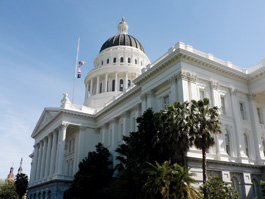home | metro santa cruz index | currents

David Monniaux, Wikimedia Commons
CAPITOL GAINS: Supporters of Prop 25, which would lower the threshold to pass a budget, say it will end gridlock in Sacramento.
Half-Empty, Half-Full
Prop. 25 is either a godsend or a tool of the devil, depending on who you ask
By Paul Wagner
OF ALL the state initiatives on the November ballot, Proposition 25 is the one measure that both proponents and opponents agree may well transform California politics. What they disagree on is whether that transformation would be a miracle or a disaster.
The miracle, say backers, is that Prop. 25—named by its original writer (linguist George Lakoff) as "The California Democracy Act"—will finally rid the state Legislature of the burden of having to corral two-thirds of its members in both houses to pass a state budget.
While that supermajority requirement functioned fairly well for a number of decades after voters first imposed it in 1933, it's proven a nearly impossible impediment to overcome in recent years. In fact, since 1978's Prop. 13 added a similar two-thirds requirement for any state tax increases beginning in 1979, further complicating the budget-balancing process, the Legislature has met its budget deadline only five times in the 32 years since.
Those delays in approving a budget, which grow longer every year, take a huge human toll. State workers were reduced to living on IOUs in 2009. This year, many nonunion state employees may, depending on the outcome of a court hearing in January, be reduced to minimum wage.
And that, say Prop. 25 backers, is just the timing problem. The bigger problem is that the two-thirds requirement is so high—high enough that of the 50 states in the union, only Arkansas and Rhode Island also set that threshold—that any minority at all can fundamentally blackmail the majority to get what it wants. Inland or coastal, northern or southern, urban or rural, any group of legislators can band together, demand whatever they wish to for their districts and fundamentally force the rest to cave.
Look, for example, says former Assembly Budget Committee chairman John Laird, at what a small clot of legislators got for their buddies in 2009: "$2 billion in tax breaks, without public vetting, with no public discussion, for large corporations, many of them out of state." And, he stresses, "This was exacted in a deal made at the last minute, in the middle of the night—just to get a budget."
Laird points to the fact that Prop. 25 both punishes legislators for future possible lollygagging (no budget = no pay of any kind for each day late, period) and makes clear right in its title that this lowering of the approval threshold from two-thirds to 50 percent plus one does not affect the two-thirds requirement for raising taxes.
'Just Window Dressing'
Opponents, however, don't believe that any of this will hold when subject to actual political practice. Yes, says Beth Miller, spokeswoman for the Committee to Stop Hidden Taxes, legislators will have to act in timely fashion and "send a budget to the governor—but the governor doesn't have to sign it." Lawmakers may well simply enact temporary language, send a budget to the governor that isn't at all ready for signature, start collecting their pay again and just await a veto.
In addition, Miller notes, Prop. 25 offers none of the deeper reforms that earlier, similar proposals (such as one California Forward proposed) did.
Those included a rainy day fund, a pay-as-you-go provision that prohibits expenditures without concurrent funding and a midyear course-correction requirement. California Forward has remained neutral on the proposition.
David Kline, vice president of Communications and Research for Cal-Tax, agrees that the no-pay-for-delay provisions are weak: "The penalties are just window dressing," he says, because "the budget doesn't actually have to be signed." Or, implicitly, even be signable. Both Kline and Miller also point out that combo appropriations bills with tax increases are often emergency measures, which aren't reversible at the ballot box. Thus, they say, it interferes with voter participation.
Opponents also harbor deep suspicion of Prop. 25's promise not to dilute the two-thirds threshold for tax increases. They quote a phrase from the state Legislative Analyst's Office review of the measure: "This measure's constitutional provisions do not specifically address the legislative vote requirement for increasing state tax revenues."
But they omit the rest of the LAO's sentence: "but the measure states that its intent is not to change the existing two-thirds vote requirement regarding state taxes."
Both sides' arguments are clear. And excepting a peculiarly ugly opponents' radio ad characterizing state lawmakers as guzzling $100 bottles of champagne at taxpayers' expense (hard to swallow when legislators' expense allowances are $142 per day), the financial context and legal analyses of their statements, which both sides provided to Santa Cruz Weekly, appear to be carefully constructed.
Ultimately, therefore, as with most public policy questions, deciding whether to support significant change comes down to what view of public servants one already harbors. Those who see them as struggling to overcome unwieldy structural obstacles will likely support Prop. 25. Those who see all pols as hiding sneaky motives will likely oppose it.
Either way, there is little doubt as to the accuracy of John Laird's summary of the potential significance of Proposition 25: "If you want to end gridlock in California," Laird says, "vote for this."
For Santa Cruz Weekly's candidate endorsements in Santa Cruz City Council and other local races, visit www.santacruz.com and click on 'News' at the top of the page starting this Thursday.
Send letters to the editor here.
|
|
|
|
|
|